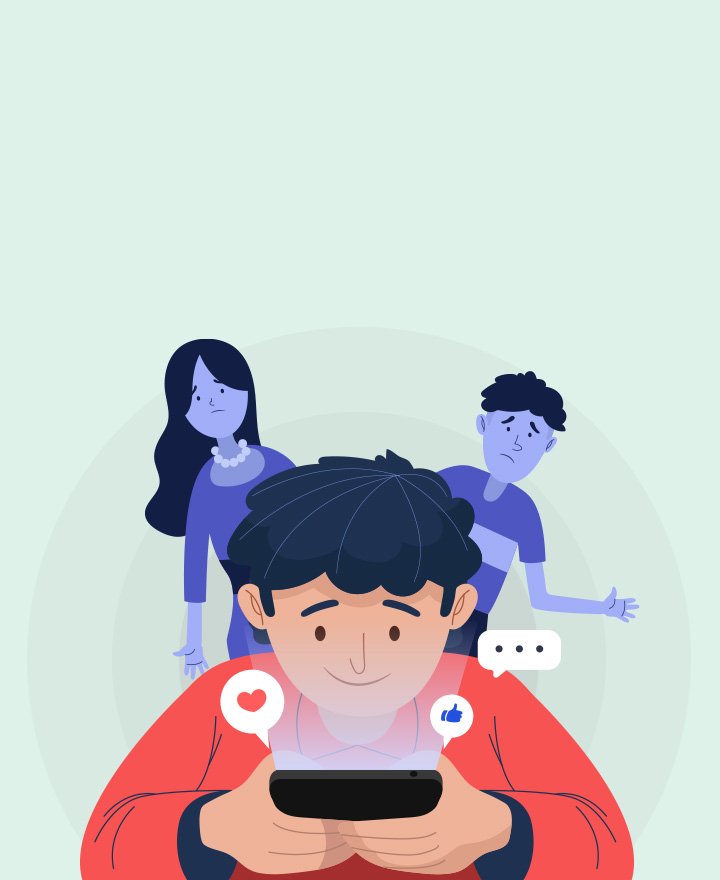

Dissociative Disorders - Symptoms and Causes
The word “dissociation” means to be disconnected from others, from the world around you or from yourself. Dissociative disorders are mental health conditions that involve experiencing a loss of connection between thoughts, memories, feelings, surroundings, behaviour and identity. Here, you will learn about the symptoms, causes, and risk factors of dissociative disorders.
What are Dissociative Disorders?
Dissociative disorders are mental health conditions that involve feelings of being detached from reality, being outside of your own body or experiencing memory loss. It involves problems with memory, identity, emotion, perception, behaviour and sense of self.
They may not be able to identify their emotions and feel detached. Some of them also cope with memory loss, where they completely forget about events in their life. Usually, they suffer from selective amnesia, where they forget painful memories. In severe cases, a person may forget where he/she lives and end up in strange places.
There are three types of dissociative disorders:
• Dissociative identity disorder
• Dissociative amnesia
• Depersonalization/derealization disorder
Symptoms
The dissociative disorder symptoms depend on type and vary between individuals. They can range from memory loss to disconnected identities and at times of stress these symptoms can worsen. Some of the common symptoms are as follows:
• A sense of being separated from your body
• A sense of separation from your emotions
• A feeling that people and things around you are unreal
• Unable to identify yourself
• Feeling severe stress at workplace and in relationships
• Unable to cope with work-related stress
• Unable to maintain a relationship
• Selective amnesia is where you forget stressful events and information in your life. At times, you also forget about people
• Depression
• Anxiety
• Suicidal thoughts
These symptoms can last for a short while, referred to as an episode, or for a longer period, which could indicate a dissociative disorder. If you're experiencing any of these symptoms, seeking professional help is essential.
Causes
Dissociation is a common experience that many people go through at some point in their lives. Different factors, such as extreme stress, traumatic events, or other mental illnesses like anxiety, can cause it.
Dissociative disorder often develops as a coping mechanism to deal with traumatic life events, long-term stress, and abuse. If a person suffers from early childhood trauma, they may develop this condition to protect themselves. Mentally removing yourself from the traumatic situation can help you escape the loss and pain. The traumatic situations that can cause dissociative disorders are as follows:
• Repeated sexual, physical, mental, or emotional abuse
• Meeting with a violent accident
• Experiencing a natural disaster
• Being part of any military combat
• Being a victim/witness of a violent crime
Risk Factors
People who have experienced physical as well as sexual abuse in childhood are at a higher risk of developing dissociative disorders. Most patients have experienced repeated overwhelming trauma in childhood. Suicide attempts and other self-injurious behaviour are common among patients with dissociative disorders. Most patients have attempted suicide.
Conclusion
If you or your child were abused during childhood, then talk to a mental health care professional about the trauma you went through. Healthcare providers diagnose dissociative disorders by assessing your symptoms and personal history. With professional treatment (usually psychotherapy), many people with a dissociative disorder can address the major symptoms of the condition and improve their daily functioning.
One of the important components of our overall wellness is also being financially secured. Healthcare emergencies can happen any time, but a good health insurance policy can protect you from such uncertain situations. To know more about Wellness and other health related tips, visit the Wellness Corner.
Source: mayoclinic, psychiatry, my.clevelandclinic
Disclaimer: This blog provides general information and discussions about health and related subjects. The information and other content provided in this blog, website or in any linked materials are not intended and should not be considered, or used as a substitute for, medical advice, diagnosis or treatment. Kindly contact your Doctor before starting a new medicine or health regime.
Related Articles
Understanding Bipolar Type 2 Disorder
Illness Anxiety Disorder & Its Classification
Understanding Separation Anxiety Disorder
Panic Attack & Panic Disorder: Are these the same?
Types of Social Anxiety Disorder and Their Impact
Published on December 14, 2023














 Health Insurance
Health Insurance  Travel Insurance
Travel Insurance  Car Insurance
Car Insurance  Cyber Insurance
Cyber Insurance  Critical Illness Insurance
Critical Illness Insurance
 Pet Insurance
Pet Insurance
 Bike/Two Wheeler Insurance
Bike/Two Wheeler Insurance  Home Insurance
Home Insurance  Third Party Vehicle Ins.
Third Party Vehicle Ins.  Tractor Insurance
Tractor Insurance  Goods Carrying Vehicle Ins.
Goods Carrying Vehicle Ins.  Passenger Carrying Vehicle Ins.
Passenger Carrying Vehicle Ins.  Compulsory Personal Accident Insurance
Compulsory Personal Accident Insurance  Travel Insurance
Travel Insurance  Rural
Rural